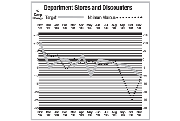2008 Retrospective: Department Stores: Neiman Marcus, Target
The luxury market suffered in 2008. One of the market’s consistently solid performers, Dallas-based The Neiman Marcus Group, reported a shocking decline of 26.8 percent in comparable-store sales in October. In a prepared Nov. 6 statement, Neiman Marcus Chairman Burton M. Tansky blamed the drop on the weak economy, and he promised to jolt sales by reducing inventory and producing promotional events.
But the luxury retailer continued to report dismal results as the holiday season began. The retailer reported a comparable-store sales decline of 11.9 percent for November. For Neiman’s first quarter for the 2009 fiscal year, released on Dec. 10, the venerable retailer reported a 14.5 percent decline in sales over the same period last year.
The company operates 40 Neiman Marcus stores nationwide and two Bergdorf Goodman stores in New York.
Although luxury is not recession-proof, it is a cyclical business, according to New York–based market-research company The Luxury Institute in an Oct. 28 paper.
Mercedes Gonzalez, a retail analyst and director of New York–buying office Global Purchasing Companies, said high-end stores such as Neiman Marcus could not be competitive in the current economy. “They lost track of what consumers’ price resistance is,” Gonzalez said about Neiman Marcus. “We’re all in a mental state of being cheap.”
Discounter Target Corp. also might have lost its way in 2008. With 1,684 stores in 48 states, it became a retail icon over the past 15 years by injecting fashion flash into its discount business thanks to partnerships with popular fashion designers—most famously Isaac Mizrahi. However, in 2008, Target consistently reported mediocre sales, and in November, it reported a comparable-store decline of 10.4 percent. In a Dec. 4 research note, Credit Suisse analyst Michael Exstein wrote that Target’s problems stem from a change in its customers’ behavior. They are buying more basics, not discretionary merchandise. Target earns 40 percent of its sales from discretionary merchandise, Exstein wrote. —Andrew Asch






















